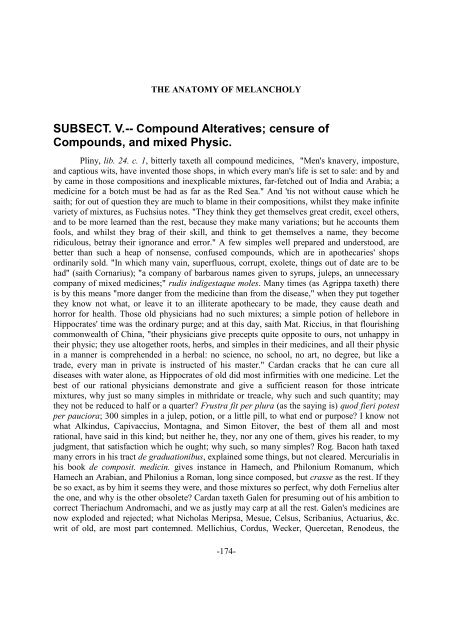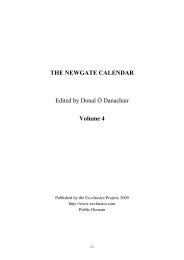PDF format (1.55 Mb) - The Ex-Classics Web Site
PDF format (1.55 Mb) - The Ex-Classics Web Site
PDF format (1.55 Mb) - The Ex-Classics Web Site
You also want an ePaper? Increase the reach of your titles
YUMPU automatically turns print PDFs into web optimized ePapers that Google loves.
THE ANATOMY OF MELANCHOLY<br />
SUBSECT. V.-- Compound Alteratives; censure of<br />
Compounds, and mixed Physic.<br />
Pliny, lib. 24. c. 1, bitterly taxeth all compound medicines, "Men's knavery, imposture,<br />
and captious wits, have invented those shops, in which every man's life is set to sale: and by and<br />
by came in those compositions and inexplicable mixtures, far-fetched out of India and Arabia; a<br />
medicine for a botch must be had as far as the Red Sea." And 'tis not without cause which he<br />
saith; for out of question they are much to blame in their compositions, whilst they make infinite<br />
variety of mixtures, as Fuchsius notes. "<strong>The</strong>y think they get themselves great credit, excel others,<br />
and to be more learned than the rest, because they make many variations; but he accounts them<br />
fools, and whilst they brag of their skill, and think to get themselves a name, they become<br />
ridiculous, betray their ignorance and error." A few simples well prepared and understood, are<br />
better than such a heap of nonsense, confused compounds, which are in apothecaries' shops<br />
ordinarily sold. "In which many vain, superfluous, corrupt, exolete, things out of date are to be<br />
had" (saith Cornarius); "a company of barbarous names given to syrups, juleps, an unnecessary<br />
company of mixed medicines;" rudis indigestaque moles. Many times (as Agrippa taxeth) there<br />
is by this means "more danger from the medicine than from the disease," when they put together<br />
they know not what, or leave it to an illiterate apothecary to be made, they cause death and<br />
horror for health. Those old physicians had no such mixtures; a simple potion of hellebore in<br />
Hippocrates' time was the ordinary purge; and at this day, saith Mat. Riccius, in that flourishing<br />
commonwealth of China, "their physicians give precepts quite opposite to ours, not unhappy in<br />
their physic; they use altogether roots, herbs, and simples in their medicines, and all their physic<br />
in a manner is comprehended in a herbal: no science, no school, no art, no degree, but like a<br />
trade, every man in private is instructed of his master." Cardan cracks that he can cure all<br />
diseases with water alone, as Hippocrates of old did most infirmities with one medicine. Let the<br />
best of our rational physicians demonstrate and give a sufficient reason for those intricate<br />
mixtures, why just so many simples in mithridate or treacle, why such and such quantity; may<br />
they not be reduced to half or a quarter? Frustra fit per plura (as the saying is) quod fieri potest<br />
per pauciora; 300 simples in a julep, potion, or a little pill, to what end or purpose? I know not<br />
what Alkindus, Capivaccius, Montagna, and Simon Eitover, the best of them all and most<br />
rational, have said in this kind; but neither he, they, nor any one of them, gives his reader, to my<br />
judgment, that satisfaction which he ought; why such, so many simples? Rog. Bacon hath taxed<br />
many errors in his tract de graduationibus, explained some things, but not cleared. Mercurialis in<br />
his book de composit. medicin. gives instance in Hamech, and Philonium Romanum, which<br />
Hamech an Arabian, and Philonius a Roman, long since composed, but crasse as the rest. If they<br />
be so exact, as by him it seems they were, and those mixtures so perfect, why doth Fernelius alter<br />
the one, and why is the other obsolete? Cardan taxeth Galen for presuming out of his ambition to<br />
correct <strong>The</strong>riachum Andromachi, and we as justly may carp at all the rest. Galen's medicines are<br />
now exploded and rejected; what Nicholas Meripsa, Mesue, Celsus, Scribanius, Actuarius, &c.<br />
writ of old, are most part contemned. Mellichius, Cordus, Wecker, Quercetan, Renodeus, the<br />
-174-
















